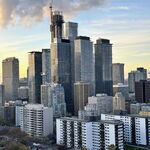A
AlvinofDiaspar
Guest
From the Star:
Province endorses Toronto's power play
City given power to make minor, major decisions
Tories oppose plan, concerned about tax powers
Jun. 13, 2006. 05:22 AM
KERRY GILLESPIE
QUEEN'S PARK BUREAU
Toronto councillors won't need provincial permission to put a speed bump on a road any more.
Along with eliminating a number of outdated rules like that one, the city has been given broad new powers to change the face of Toronto by setting design standards for buildings and targeting development to specific areas. More controversially, it will have new powers to tax such things as tobacco and alcohol.
The provincial Legislature passed a new City of Toronto Act yesterday in a 58-20 vote, with Liberals and New Democrats supporting it and Progressive Conservatives opposing it.
The law should be in effect by the end of the year.
It's not everything the city originally wanted and it's not, by most measures, all the city needs, but Mayor David Miller is happy just the same.
"I applaud Premier Dalton McGuinty and the provincial government for listening to Toronto and recognizing the unique needs of this great city," he said in a statement yesterday.
The mayor was not in the Legislature when the act, the product of years of lobbying, was passed.
In exchange for the new powers, Miller is expected to "streamline" the way the city runs. If he doesn't, the province has retained the power to impose changes and could decide to force the issue.
The view at Queen's Park, and in many business circles, has long been that councillors spend too much time discussing neighbourhood issues like front-yard parking and not enough time developing sound fiscal policies and a strategic direction for the city.
The province favours a system that puts more decision-making power in the hands of the mayor and a small group of councillors.
"Toronto will be able to deal with a lot of issues in a much more direct fashion," Municipal Affairs Minister John Gerretsen said of the changes.
Right now, if the province doesn't specifically say the city can do something, it can't.
The law will end provincial micromanaging of everything from putting a speed bump on a road to setting bar hours.
"Will it solve all the problems? No," Gerretsen said.
Progressive Conservative Leader John Tory fears it will actually cause more.
"This is a bill that focused on new powers to tax and new ways to get money from taxpayers," Tory said.
The province should have fixed the city's fiscal problems caused, in part, by downloading instituted by the last Progressive Conservative government, he said.
"I hope the city doesn't use those powers to tax going forward because taxpayers are paying enough," he said.
The business community fears that councillors, always short of cash, will jump at the opportunity to tax everything from tobacco and alcohol to parking and vehicle registrations as a way to avoid raising the property taxes of voting homeowners.
City staff have estimated the new taxing powers are worth about $50 million a year. The province contends they are worth much more.
"It will do a little bit of good, but it is certainly not the answer," NDP Leader Howard Hampton said of the act. "It's not going to solve in any way Toronto's financial difficulties."
When the push first came to give Canada's largest city more power, it was also about giving Toronto new ways to raise revenue.
The city wanted a portion of provincial sales and income taxes so it could reduce its reliance on property tax. Queen's Park said no and gave the city the power to add on its own tax to various goods and services.
Along the way, the province shifted the debate to focus on the need for city council to change the way it operates in order to better use its new powers.
"The city is left with a highly problematic financial situation and (a law) ... far less substantial than the city needs," NDP MPP Peter Tabuns said.
"(The law) may not be perfect in everyone's eyes," Gerretsen said during debate. But it "is a much, much better situation than the bills that currently govern the City of Toronto."
AoD
Province endorses Toronto's power play
City given power to make minor, major decisions
Tories oppose plan, concerned about tax powers
Jun. 13, 2006. 05:22 AM
KERRY GILLESPIE
QUEEN'S PARK BUREAU
Toronto councillors won't need provincial permission to put a speed bump on a road any more.
Along with eliminating a number of outdated rules like that one, the city has been given broad new powers to change the face of Toronto by setting design standards for buildings and targeting development to specific areas. More controversially, it will have new powers to tax such things as tobacco and alcohol.
The provincial Legislature passed a new City of Toronto Act yesterday in a 58-20 vote, with Liberals and New Democrats supporting it and Progressive Conservatives opposing it.
The law should be in effect by the end of the year.
It's not everything the city originally wanted and it's not, by most measures, all the city needs, but Mayor David Miller is happy just the same.
"I applaud Premier Dalton McGuinty and the provincial government for listening to Toronto and recognizing the unique needs of this great city," he said in a statement yesterday.
The mayor was not in the Legislature when the act, the product of years of lobbying, was passed.
In exchange for the new powers, Miller is expected to "streamline" the way the city runs. If he doesn't, the province has retained the power to impose changes and could decide to force the issue.
The view at Queen's Park, and in many business circles, has long been that councillors spend too much time discussing neighbourhood issues like front-yard parking and not enough time developing sound fiscal policies and a strategic direction for the city.
The province favours a system that puts more decision-making power in the hands of the mayor and a small group of councillors.
"Toronto will be able to deal with a lot of issues in a much more direct fashion," Municipal Affairs Minister John Gerretsen said of the changes.
Right now, if the province doesn't specifically say the city can do something, it can't.
The law will end provincial micromanaging of everything from putting a speed bump on a road to setting bar hours.
"Will it solve all the problems? No," Gerretsen said.
Progressive Conservative Leader John Tory fears it will actually cause more.
"This is a bill that focused on new powers to tax and new ways to get money from taxpayers," Tory said.
The province should have fixed the city's fiscal problems caused, in part, by downloading instituted by the last Progressive Conservative government, he said.
"I hope the city doesn't use those powers to tax going forward because taxpayers are paying enough," he said.
The business community fears that councillors, always short of cash, will jump at the opportunity to tax everything from tobacco and alcohol to parking and vehicle registrations as a way to avoid raising the property taxes of voting homeowners.
City staff have estimated the new taxing powers are worth about $50 million a year. The province contends they are worth much more.
"It will do a little bit of good, but it is certainly not the answer," NDP Leader Howard Hampton said of the act. "It's not going to solve in any way Toronto's financial difficulties."
When the push first came to give Canada's largest city more power, it was also about giving Toronto new ways to raise revenue.
The city wanted a portion of provincial sales and income taxes so it could reduce its reliance on property tax. Queen's Park said no and gave the city the power to add on its own tax to various goods and services.
Along the way, the province shifted the debate to focus on the need for city council to change the way it operates in order to better use its new powers.
"The city is left with a highly problematic financial situation and (a law) ... far less substantial than the city needs," NDP MPP Peter Tabuns said.
"(The law) may not be perfect in everyone's eyes," Gerretsen said during debate. But it "is a much, much better situation than the bills that currently govern the City of Toronto."
AoD




